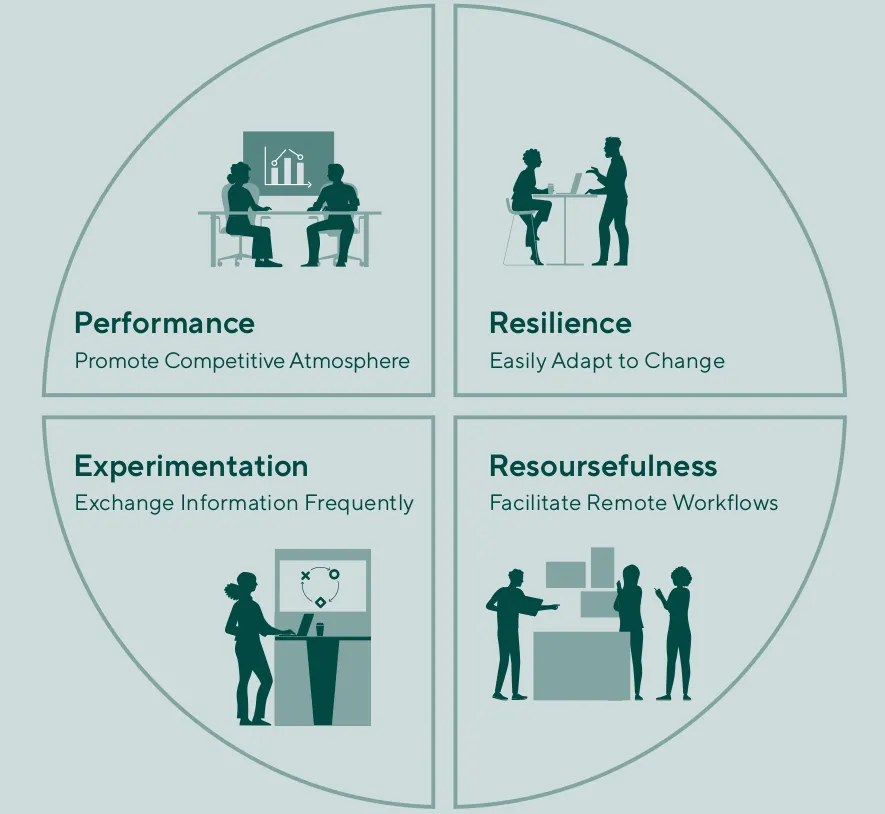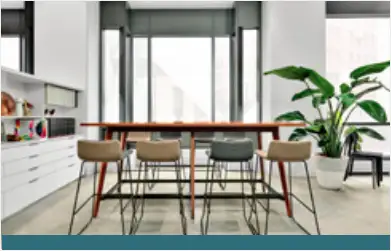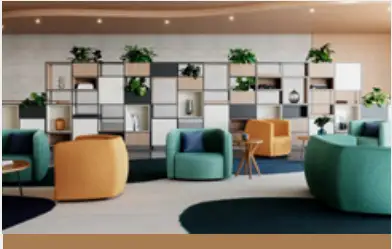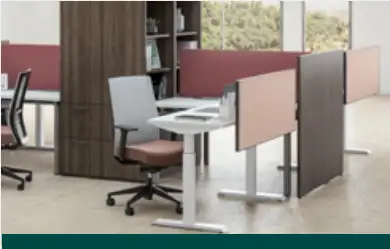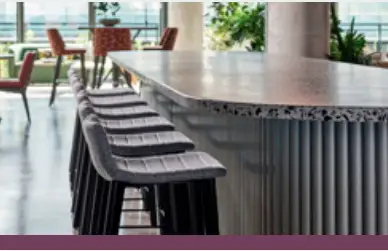Designing Agile Workspaces for Navigating Change
Within every organization, there is a distinct culture that shapes the dynamics of its workforce and influences how individuals interact and work together. Organizational cultures can vary considerably from each other, with each showcasing distinct attributes, values, and beliefs that impact an employee's sense of belonging within the workplace. Among Kimball International’s five identified culture types, the Adaptor culture is one defined by resilience, performance, and the ability to navigate change effectively. By understanding the distinctive characteristics of the Adaptor culture, we can design workspaces that amplify its strengths, creating a purposeful environment that enhances productivity and a sense of belonging for all.
Understanding the Adaptor Culture
The Adaptor culture stands out for its remarkable ability to persevere and adapt in the face of market fluctuations. Known for navigating challenges like mergers and acquisitions, this culture thrives on resilience and resourcefulness. Through its performance-driven approach, this culture embraces change as an opportunity for growth and promotes a competitive atmosphere, encouraging employees to experiment and push limits to achieve targets and company goals. This culture often has variable sources of funding, such as advertisers, grants, or donations. The Adaptor culture exemplifies adaptability not only in its financial strategies but also in its work arrangements, often supporting a predominantly remote team.
Adaptor Culture Traits
Space Design Considerations
Creating workspaces that support the Adaptor culture's agile nature and performance-driven mindset involves the thoughtful consideration of workspace settings and sensory design elements. As a culture that primarily works remotely, it becomes crucial to provide tech-enabled zones for adaptive collaboration and stimulating social spaces that unite workers with a shared sense of purpose when they are in the office together. Height-adjustable, ergonomic furniture and dedicated spaces that support mental health and well-being offer employees the comfort, respite, and reflection needed to cultivate resilience and improved performance. Also, consider integrating low-stimuli areas with visual and acoustic privacy and storage options that reduce clutter to support individual productivity and focused work.
The Value of Human Centered Design
1. Kimball International, Understanding the Evolving Workplace Study, 2022
2. O.C. Tanner Institute, Global Culture Study, 2023
3. Kimball International, Workplace Assessment on Culture & Belonging, 2024
4. Gensler, Global Workplace Survey Comparison, 2023
The Role of Space Types Within the Adaptor Culture
Kimball International’s research uncovered six pivotal space types that are crucial for cultivating a thriving workplace and elevating a sense of belonging. Specific to the needs of the Adaptor culture, the space types can be prioritized in the following way :
Space Ratio Suggestions for the Adaptor Culture
The Meet-Up
At the forefront of the Adaptor culture's workspace needs are Meet-Up spaces. These tech-savvy environments are designed to facilitate both physical and virtual meetings, supporting the adaptability and problem solving needed to navigate change effortlessly. Whether team members come together in person or connect virtually, these spaces are highly functional, encouraging seamless collaboration and exploration.
The Hub
Often described as the heartbeat of the office, the Hub plays a pivotal role in fostering socialization and connectedness within the Adaptor culture, essential behaviors to cultivate among a predominantly remote workforce. A central gathering point with comfortable, casual, and eclectic elements, the Hub offers a stimulating area that sparks spontaneous conversations and investigative exchanges that reinforce experimentation. It also contributes to employee solidarity by fostering relationships and a shared sense of purpose.
Well + Good
Dedicated to employee well-being, Well + Good spaces play a significant role in supporting the physical and mental health of those within the Adaptor culture. Height-adjustable furnishings provide personalized comfort and support postural changes throughout the day, crucial in boosting productivity within a performance-driven environment. Providing dedicated areas for relaxation, reflection, and activities like yoga and meditation contributes to a refreshed and mentally resilient workforce that is better prepared for navigating ongoing change.
Work Your Way
Work Your Way spaces accommodate the diverse work styles prevalent in a primarily remote team typically found in the Adaptor culture. These areas support users throughout their workday, whether they are performing solo tasks or engaging in collaborative activities. Providing visual and acoustic privacy for individual focus when needed while also allowing for planned and impromptu interactions, Work Your Way spaces reflect the flexibility and resourcefulness inherent in the Adaptor culture's approach to work.
Culture Café
Culture Café spaces define an organization's brand and culture, fostering positive experiences for employees, external partners, and customers. Providing diverse seating options, these spaces are ideal for grabbing a bite to eat, conducting informal meetings, and spurring spontaneous interactions. This is where individuals can come together, share ideas, and build relationships, fostering a climate of creativity and open communication that can be lacking in remote-only work scenarios.
Room on the Move
Room on the Move spaces feature versatile and movable furniture solutions that allow workers to change layouts as needed to support various tasks, such as hands-on activities, learning, and training. The flexibility of Room on the Move spaces aligns with this culture's adaptable approach, providing an environment that promotes resourcefulness and encourages experimentation.
Creating Places to Belong
Crafting a work environment that brings out the best of the Adaptor culture involves a purposeful combination of space types that prioritize collaboration, socialization, and well-being to balance the solo nature of remote work. By integrating these space types in an appropriate ratio, Adaptor organizations can create effective workspaces that fully connect workers, fostering beneficial communication and interactions that inspire heightened performance. This approach ensures that the work environment becomes an essential resource for nurturing resilience and adaptability in the face of constant change while also contributing to a greater sense of belonging.

